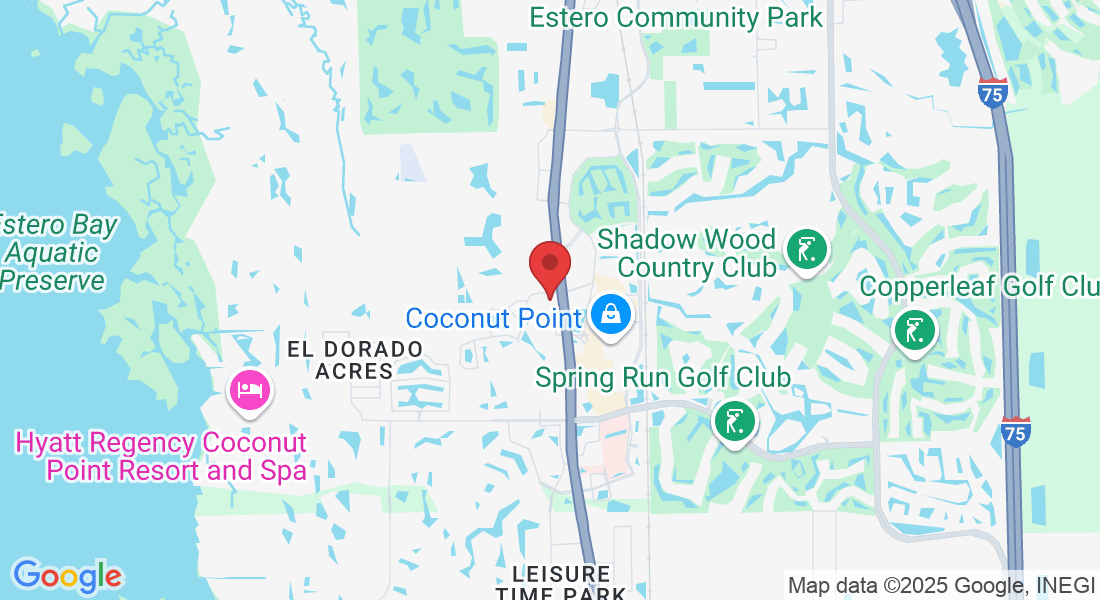Redefining Memory Care In Estero Florida
Choosing the right memory care community for a loved one is a deeply personal decision. At Gulf Coast Memory Care, nestled in the heart of Estero, Florida, we've created a haven of tranquility where residents can experience a luxurious and comfortable lifestyle. Let us help you make this important decision with confidence.
"Choose us with peace of mind; if within 90 days your heart pulls you elsewhere, we'll ensure a smooth transition and give your community fee back to help secure another place."
Your family's freedom to thrive is our top priority.

Understanding The Benefits Of Memory Care
Hear From Benita
Watch the heartfelt moment when Benita's engineer husband confidently declared, "This is the place!" It was here that Benita found the ideal environment for her mother to receive the nurturing care and robust support she truly deserved.
We believe you'll resonate with their story and feel just as confident in our ability to provide exceptional care.
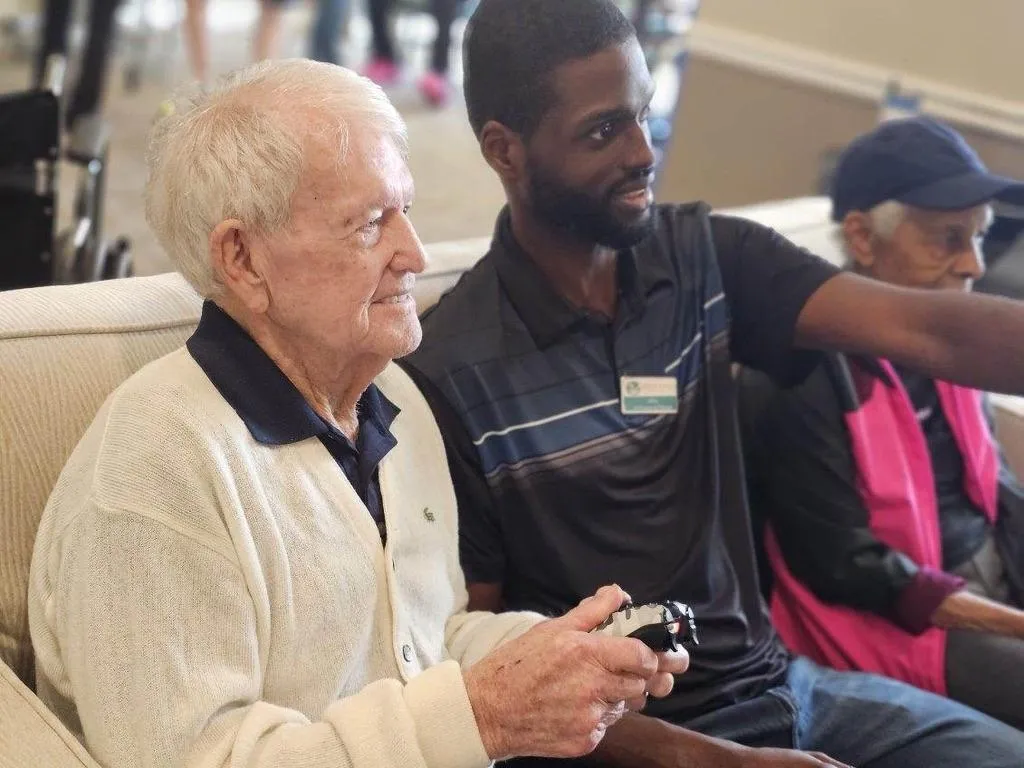
Is It The Right Time For Memory Care?
Understanding that memory care is not a one-size-fits-all solution, we prioritize personalized care plans that adapt to each individual’s progression.
Learn more about memory care and get personalized results in this quick 5 minute survey.

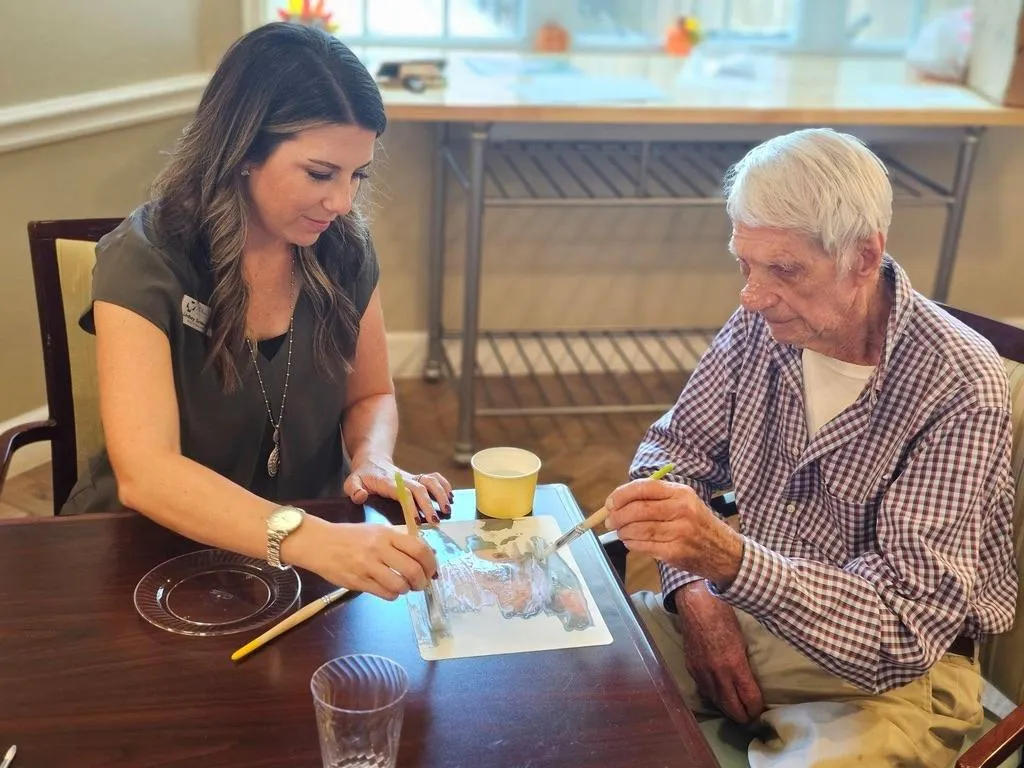
A Community For Alzheimer’s & Dementia Care
Families seeking Alzheimer’s and dementia support in Estero, Florida, can rely on our compassionate team for a community that truly cares.
Through ongoing training in the latest memory care practices and a commitment to safety, Gulf Coast Memory Care offers peace of mind for families and the highest standard of care for residents.
Love From Our Families


My mom moved into her new home a few weeks ago. I was able to visit with her this week while being in Florida and my gosh, I know she is right where she needs to be. Huge shoutout to Jerry, Diana, Paula, Kathy and Apryl. You are real life angels. The energy you bring is above and beyond. To see how you interact with not only my mom, but all the residents, it truly warms my heart. While it is heartbreaking to see my mom battle Alzheimer's, I know she is in the perfect place. She is safe and receiving the care she needs. <3 The place is clean, accommodating and most importantly feels like home. I love that there is a schedule and many activities for the residents to participate in. My mom has loved the painting and coloring
- Bill & Bonny B


Upon entering this beautiful community, I was deeply impressed by the exceptional level of care and compassion demonstrated by all the caregivers. Every member of the team, from maintenance staff to the executive director, significantly contributes to the residents' quality of life. The interior courtyards offer a safe and beautiful outdoor escape for the residents, while the dining area is both elegant and spacious. GCMC stands out as one of the premier memory care centers I have ever visited.
- Bill & Bonny B


Exceptional dedication. Genuine care 24/7, everyone is doing a great job, from Management to the care team. Jerry and Diana are conducting the business, but you can see them walking the hallway and chatting with the residents, literally knowing everyone. There is an engine who works behind the scenes to have the day and night activity running smoothly. Family feeling, warmth, and genuine care, overall, 5 stars. Residents are never alone, there is always a pair of eyes to watch and hands ready to help as needed, but all is done in a certain way, so our loved ones don’t feel any loss of their independence. Beautifully done. The activities are not just lines on paper, everyone is involved. Food is first class.
- Bill & Bonny B
Our Senior Care Amenities
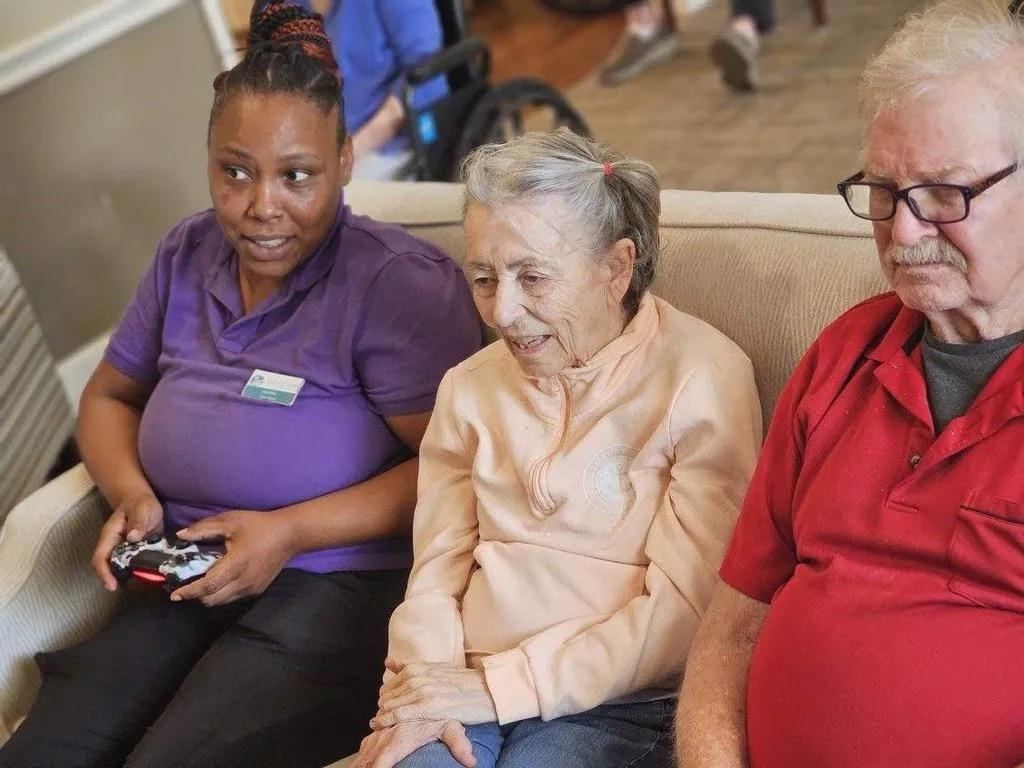
One-site beauty salon and barbershop
Personalized, chef-prepared meals
Customized activity programs
Craft and hobby room
Family living room
Full Library
Abundant natural light to minimize sundowning
Located next to Coconut Point Shopping Center
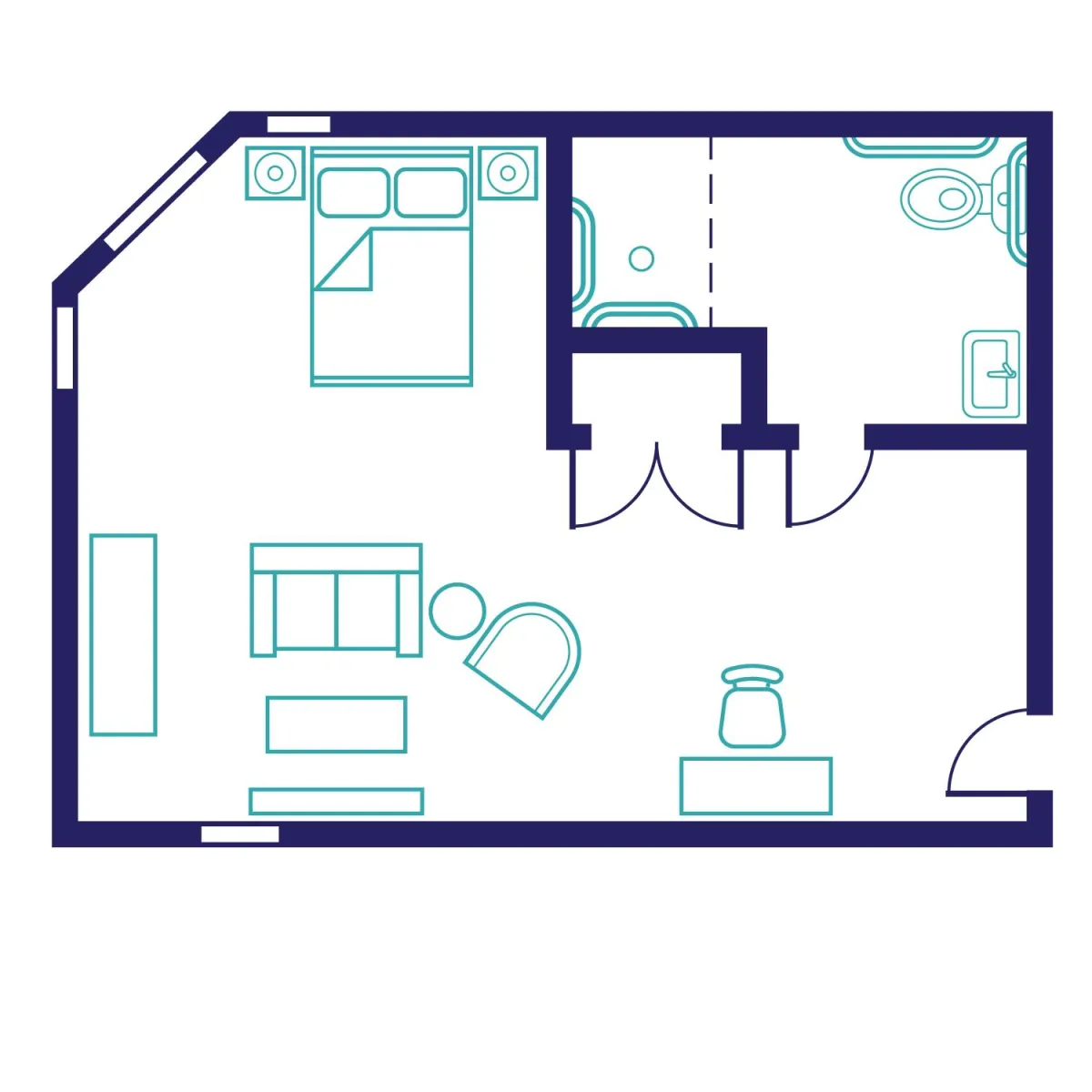
The Edison Suite
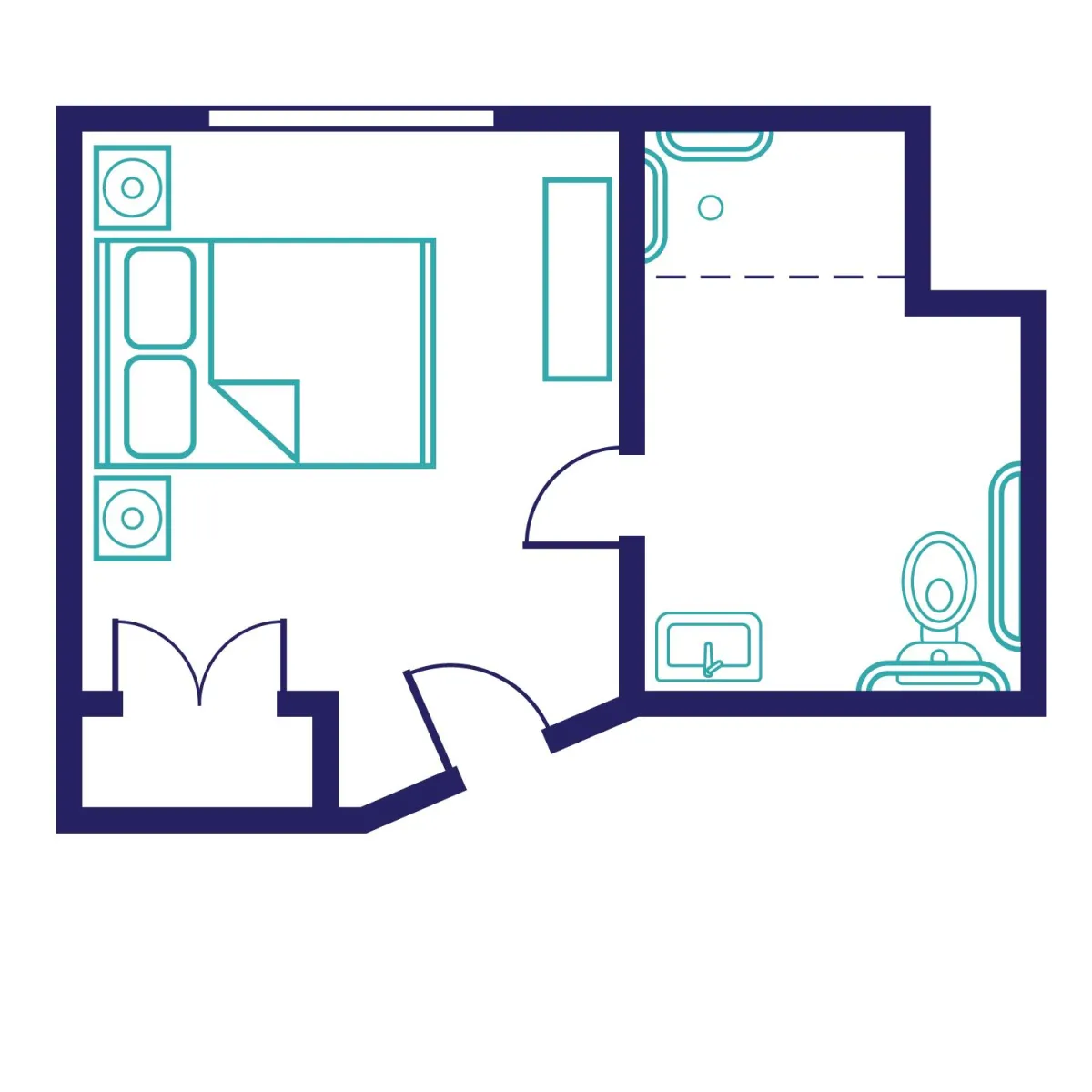
The Magnolia Suite
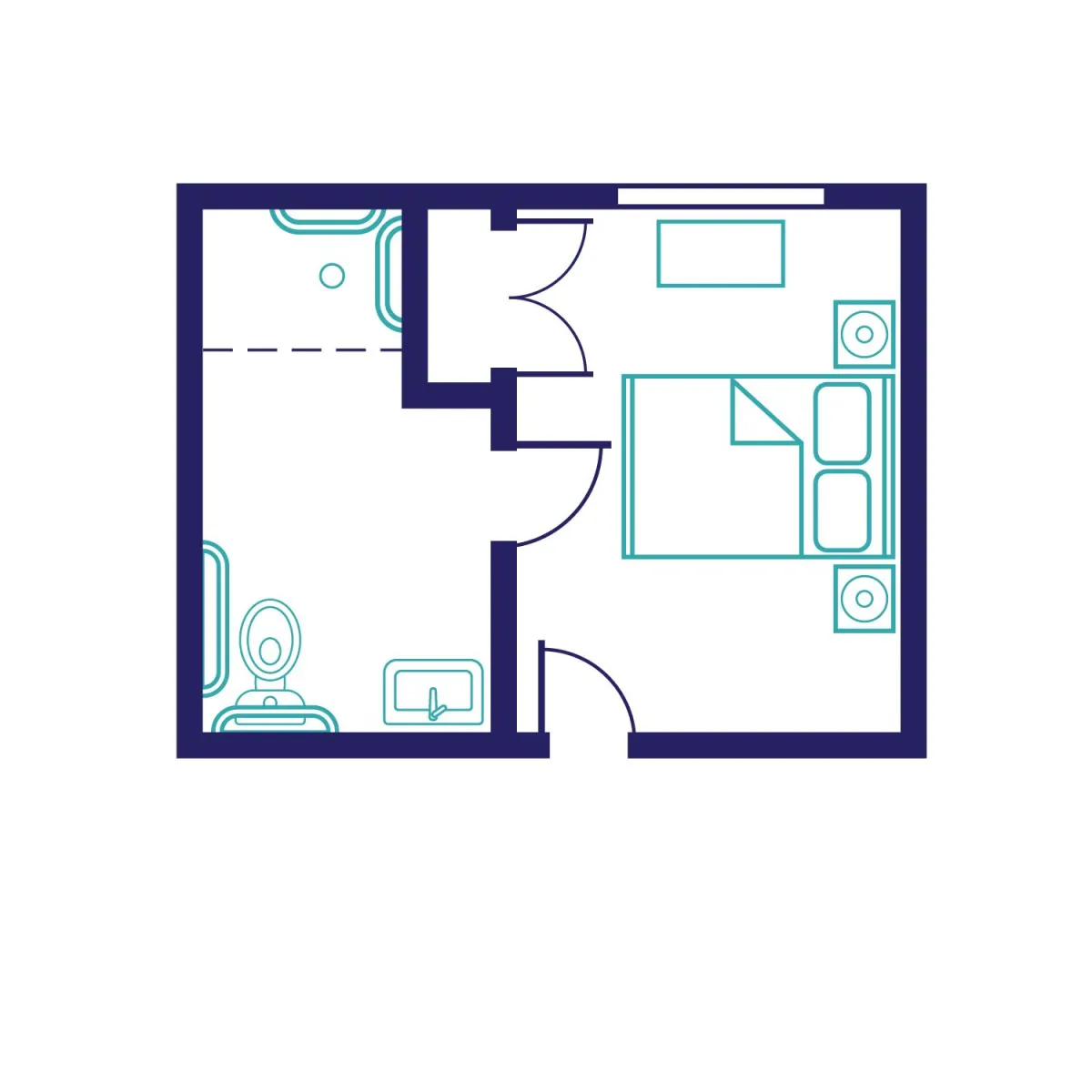
The Sugarberry Suite
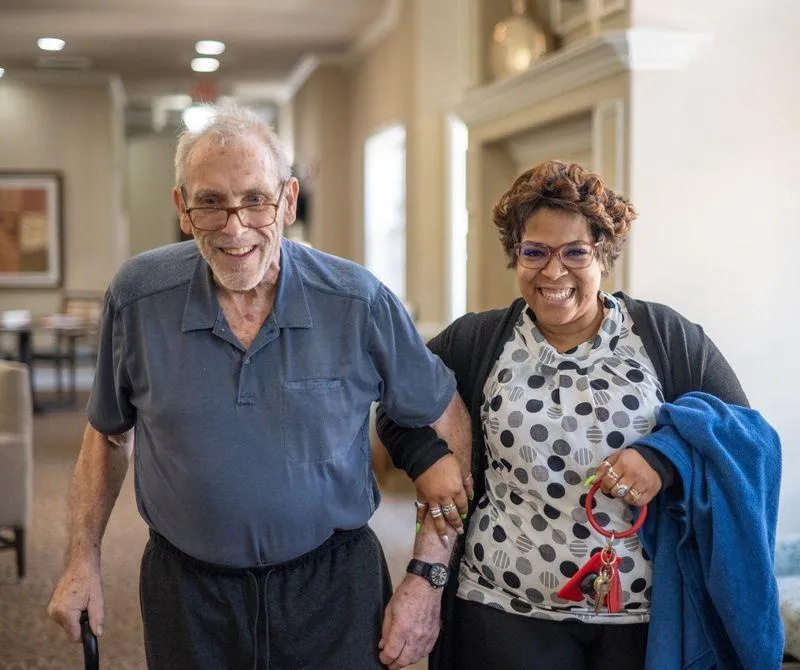
Engaging Residents With Meaningful Social Connections
We also prioritize activities that nurture both physical and mental wellness, from gentle exercise routines to social events that create a sense of community among residents. These carefully crafted programs are designed to boost mood, reduce anxiety, and encourage meaningful interactions, all of which contribute to a fulfilling lifestyle for those facing memory challenges.
Our Commitment To You
Our commitment extends to providing families with guidance and resources to understand memory loss and navigate the journey with confidence. Whether it’s through educational workshops or one-on-one consultations, we’re here to support families every step of the way, ensuring they feel connected and informed about their loved one’s care journey.
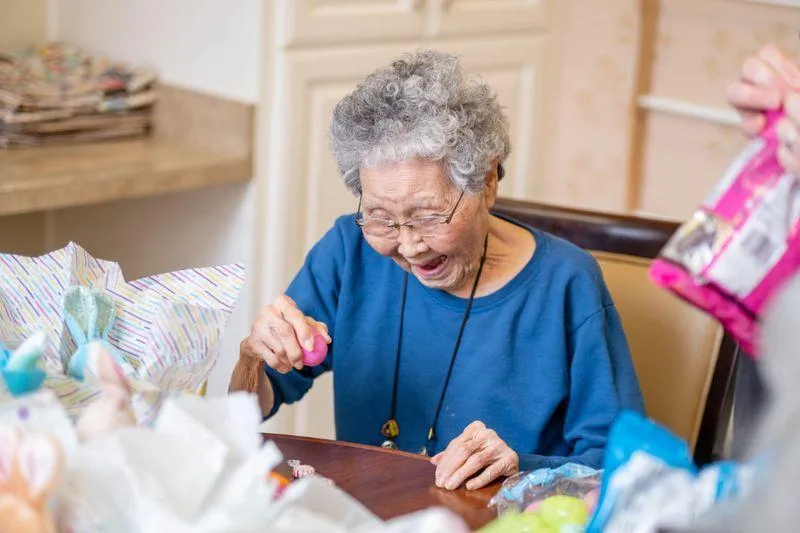
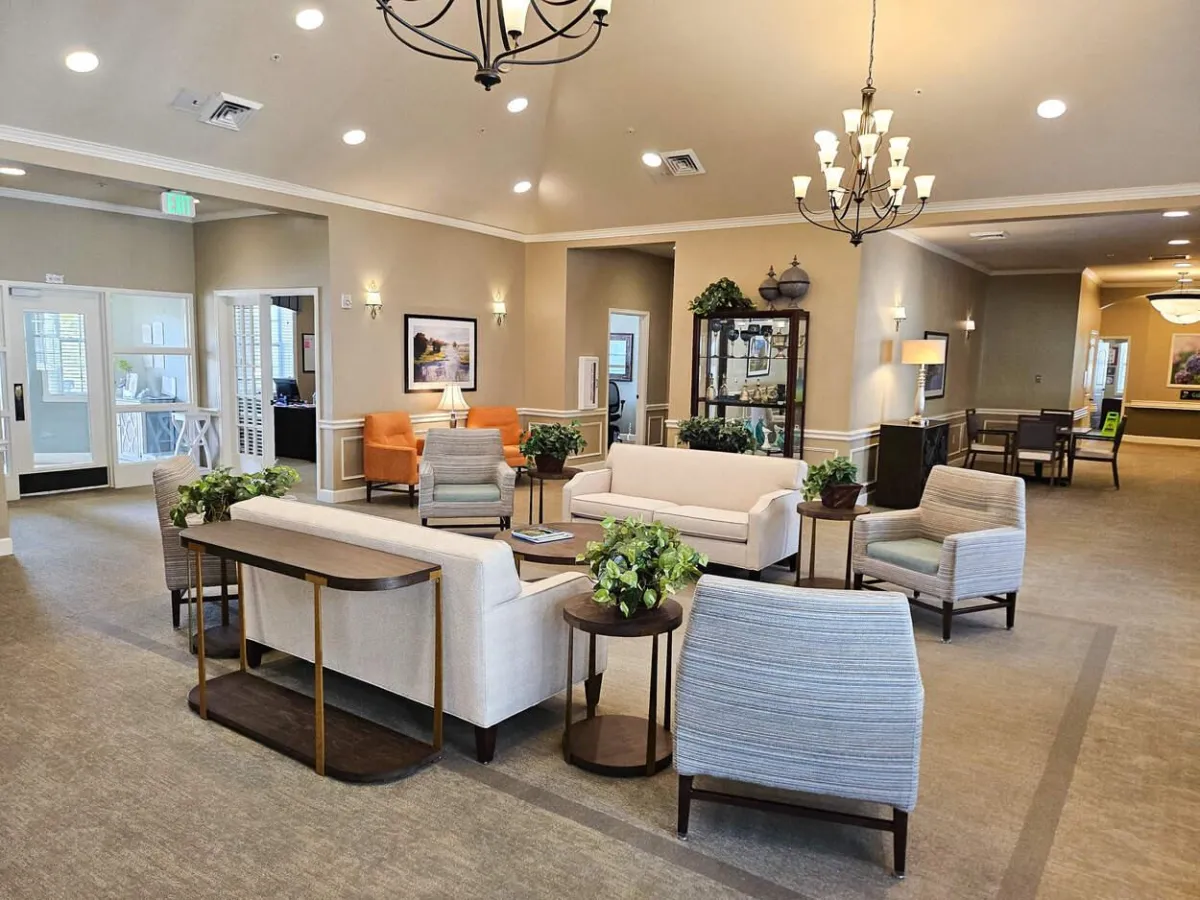
Are You Ready To Get Settled In?
Embark on a transformative experience at Gulf Coast Memory Care in Estero, Florida. We're not just a memory care community; we're a sanctuary where the mind, body, and spirit are nurtured. If you're seeking a place where compassion, care, and a deep respect for the human soul are paramount, you've found the right haven.
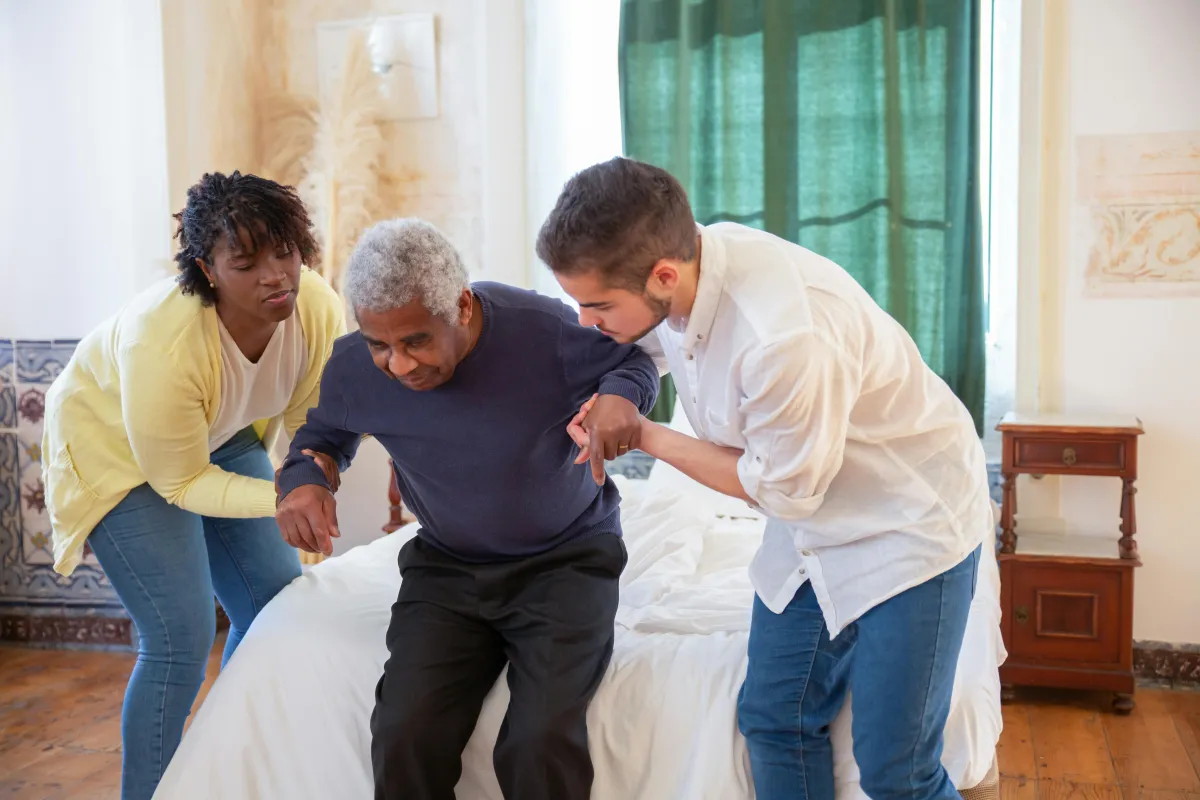
Elderly Fall Prevention: Care Tips and Strategies
Falls among seniors can be a significant concern. They are a leading cause of injury and can have both physical and psychological impacts.
The fear of falling again can lead to reduced activity. This, in turn, can increase the risk of future falls.
Understanding these complexities is crucial for caregivers. It helps them provide the right support and implement effective fall-prevention strategies. In this article, we aim to guide caregivers in restoring confidence in seniors after a fall by offering practical tips and strategies for elderly fall prevention and senior fall recovery.
We will also delve into the consequences of falls in the elderly and explore how to create a safe and supportive environment for seniors! But first, it's important to understand the significant impact that falls can have.
Understanding the Impact of a Fall
Falls can have severe consequences for seniors. They may lead to physical injuries such as fractures or head trauma. These injuries can result in prolonged recovery times and a decrease in overall mobility.
Beyond physical injuries, falls often leave emotional scars. Fear of falling again can weigh heavily on a senior's mind. This fear can cause anxiety and lead to social withdrawal. Understanding these impacts is essential for caregivers. Recognizing both the physical and emotional toll can guide more effective support and recovery strategies. Acknowledging and addressing these aspects can help restore confidence in seniors.
Immediate Response and Medical Evaluation
Responding promptly after a fall is crucial. Immediate action can reduce the risk of further injury. Caregivers should remain calm and assess the situation. This helps determine if emergency assistance is needed.
Once safety is ensured, a medical evaluation should follow. A healthcare provider can identify underlying health issues that may have contributed to the fall. Essential steps in the immediate response include:
Checking for injuries and calling for help if necessary.
Keeping the senior as comfortable and calm as possible.
Documenting the fall incident for follow-up with healthcare professionals.
A thorough medical evaluation helps tailor future care plans and prevent future falls.
Developing a Personalized Care Plan
Creating a personalized care plan is essential for a senior's recovery. Each individual's needs should be assessed carefully to ensure the most effective support. A tailored approach considers their medical history, current abilities, and emotional state.
Involving healthcare professionals in the planning process is vital. This collaboration ensures that all aspects of the senior's well-being are addressed. Regular reviews of the care plan allow adjustments as the senior progresses or if their needs change. Personalizing care fosters confidence and empowers seniors on their path to recovery.
The Role of Physical Therapy in Recovery
Physical therapy is a cornerstone of fall recovery for seniors. It helps restore strength and balance, reducing the risk of future falls. A skilled therapist can create a safe and effective exercise regimen tailored to the senior's condition and capabilities.
Consistency in attending therapy sessions is crucial for meaningful progress. Physical therapy not only aids in the physical recovery process but also enhances confidence. Seniors who engage in tailored exercise programs often experience improved mobility and a greater sense of independence. This renewed autonomy is key to restoring their confidence after a fall.
Home Safety Assessments and Modifications
Home safety assessments are vital for identifying potential fall hazards. An evaluation can reveal areas needing improvement to enhance safety. Trained professionals or caregivers can perform these assessments to ensure all risks are addressed.
Effective modifications may include:
Installing grab bars in bathrooms.
Securing loose rugs and cords.
Improving lighting throughout the home.
Using non-slip mats in high-risk areas.
Such changes create a safer living environment that supports seniors' independence. Making these simple yet effective adjustments can significantly reduce fall risks. By proactively addressing hazards, caregivers can provide peace of mind for seniors and their families, ensuring a more secure and supportive home.
Encouraging Regular Exercise and Activity
Physical activity is crucial for maintaining strength and balance, both of which are essential for fall prevention. Seniors should engage in exercises tailored to their abilities and needs. Activities such as walking, gentle yoga, or water aerobics can be beneficial.
Even small amounts of exercise can enhance mobility and confidence. It's important to encourage seniors to stay active within comfortable limits. Consistent movement not only supports physical health but also boosts mood and reduces fear of falling. By incorporating regular exercise into their routine, seniors can improve their overall well-being while reducing the risk of future falls.
Nutrition, Hydration, and Medication Management
Proper nutrition is vital for seniors, supporting muscle strength and overall health. A balanced diet should include a variety of nutrients to maintain energy and vitality. Ensuring adequate calcium and vitamin D intake is particularly important for bone health.
Hydration plays a key role in preventing dizziness and confusion, common causes of falls. Seniors should be encouraged to drink water throughout the day to stay well-hydrated. Additionally, regular reviews of medications with a healthcare provider can help manage side effects or interactions that may increase fall risk. By focusing on these aspects, caregivers can support seniors in maintaining their health and reducing fall risks.
Emotional Support and Overcoming the Fear of Falling
Experiencing a fall can significantly affect a senior's confidence. The fear of falling again may lead to decreased activity and increased isolation. Providing emotional support is crucial to help seniors rebuild their sense of security and independence.
Caregivers should encourage open communication about these fears, validating feelings while reassuring seniors of safety measures. Involvement in social activities can also play a vital role in restoring confidence. Engaging with friends and participating in community events can boost morale and shift focus away from fear, gradually helping seniors reclaim their independence.
Fall Prevention Education and Awareness
Educating seniors and their families on fall prevention is essential to minimizing risks. Awareness empowers seniors, helping them understand the importance of safety measures and their active role in preventing falls. Education should be ongoing, adapting as the senior’s health and abilities change.
Discussing fall risks openly encourages cooperation and instills confidence. It allows seniors to voice concerns and be involved in creating a safer environment. Caregivers can provide practical tips and resources to increase awareness, ensuring that preventive strategies are consistently integrated into daily life, ultimately reducing the likelihood of falls and promoting overall well-being.
Leveraging Technology and Community Resources
Using technology and community resources can significantly enhance fall prevention efforts. Devices like motion sensors and emergency response systems provide peace of mind and quick assistance. Local community programs offer valuable support, education, and social engagement opportunities, all of which contribute to a safer and more connected environment for seniors.
Conclusion: Building a Supportive Environment for Seniors
Creating a safe environment involves collaboration, awareness, and empathy. By prioritizing fall prevention and offering emotional and physical support, we empower seniors. This integrated approach not only aids recovery but also instills confidence, enhancing their quality of life and independence. In senior care, where unique challenges and needs are present, fostering a safe, supportive environment becomes even more critical. If you’d like to learn more about how we prioritize safety and support, we invite you to schedule a tour to see our community in action and ask any questions you may have.

Elderly Fall Prevention: Care Tips and Strategies
Falls among seniors can be a significant concern. They are a leading cause of injury and can have both physical and psychological impacts.
The fear of falling again can lead to reduced activity. This, in turn, can increase the risk of future falls.
Understanding these complexities is crucial for caregivers. It helps them provide the right support and implement effective fall-prevention strategies. In this article, we aim to guide caregivers in restoring confidence in seniors after a fall by offering practical tips and strategies for elderly fall prevention and senior fall recovery.
We will also delve into the consequences of falls in the elderly and explore how to create a safe and supportive environment for seniors! But first, it's important to understand the significant impact that falls can have.
Understanding the Impact of a Fall
Falls can have severe consequences for seniors. They may lead to physical injuries such as fractures or head trauma. These injuries can result in prolonged recovery times and a decrease in overall mobility.
Beyond physical injuries, falls often leave emotional scars. Fear of falling again can weigh heavily on a senior's mind. This fear can cause anxiety and lead to social withdrawal. Understanding these impacts is essential for caregivers. Recognizing both the physical and emotional toll can guide more effective support and recovery strategies. Acknowledging and addressing these aspects can help restore confidence in seniors.
Immediate Response and Medical Evaluation
Responding promptly after a fall is crucial. Immediate action can reduce the risk of further injury. Caregivers should remain calm and assess the situation. This helps determine if emergency assistance is needed.
Once safety is ensured, a medical evaluation should follow. A healthcare provider can identify underlying health issues that may have contributed to the fall. Essential steps in the immediate response include:
Checking for injuries and calling for help if necessary.
Keeping the senior as comfortable and calm as possible.
Documenting the fall incident for follow-up with healthcare professionals.
A thorough medical evaluation helps tailor future care plans and prevent future falls.
Developing a Personalized Care Plan
Creating a personalized care plan is essential for a senior's recovery. Each individual's needs should be assessed carefully to ensure the most effective support. A tailored approach considers their medical history, current abilities, and emotional state.
Involving healthcare professionals in the planning process is vital. This collaboration ensures that all aspects of the senior's well-being are addressed. Regular reviews of the care plan allow adjustments as the senior progresses or if their needs change. Personalizing care fosters confidence and empowers seniors on their path to recovery.
The Role of Physical Therapy in Recovery
Physical therapy is a cornerstone of fall recovery for seniors. It helps restore strength and balance, reducing the risk of future falls. A skilled therapist can create a safe and effective exercise regimen tailored to the senior's condition and capabilities.
Consistency in attending therapy sessions is crucial for meaningful progress. Physical therapy not only aids in the physical recovery process but also enhances confidence. Seniors who engage in tailored exercise programs often experience improved mobility and a greater sense of independence. This renewed autonomy is key to restoring their confidence after a fall.
Home Safety Assessments and Modifications
Home safety assessments are vital for identifying potential fall hazards. An evaluation can reveal areas needing improvement to enhance safety. Trained professionals or caregivers can perform these assessments to ensure all risks are addressed.
Effective modifications may include:
Installing grab bars in bathrooms.
Securing loose rugs and cords.
Improving lighting throughout the home.
Using non-slip mats in high-risk areas.
Such changes create a safer living environment that supports seniors' independence. Making these simple yet effective adjustments can significantly reduce fall risks. By proactively addressing hazards, caregivers can provide peace of mind for seniors and their families, ensuring a more secure and supportive home.
Encouraging Regular Exercise and Activity
Physical activity is crucial for maintaining strength and balance, both of which are essential for fall prevention. Seniors should engage in exercises tailored to their abilities and needs. Activities such as walking, gentle yoga, or water aerobics can be beneficial.
Even small amounts of exercise can enhance mobility and confidence. It's important to encourage seniors to stay active within comfortable limits. Consistent movement not only supports physical health but also boosts mood and reduces fear of falling. By incorporating regular exercise into their routine, seniors can improve their overall well-being while reducing the risk of future falls.
Nutrition, Hydration, and Medication Management
Proper nutrition is vital for seniors, supporting muscle strength and overall health. A balanced diet should include a variety of nutrients to maintain energy and vitality. Ensuring adequate calcium and vitamin D intake is particularly important for bone health.
Hydration plays a key role in preventing dizziness and confusion, common causes of falls. Seniors should be encouraged to drink water throughout the day to stay well-hydrated. Additionally, regular reviews of medications with a healthcare provider can help manage side effects or interactions that may increase fall risk. By focusing on these aspects, caregivers can support seniors in maintaining their health and reducing fall risks.
Emotional Support and Overcoming the Fear of Falling
Experiencing a fall can significantly affect a senior's confidence. The fear of falling again may lead to decreased activity and increased isolation. Providing emotional support is crucial to help seniors rebuild their sense of security and independence.
Caregivers should encourage open communication about these fears, validating feelings while reassuring seniors of safety measures. Involvement in social activities can also play a vital role in restoring confidence. Engaging with friends and participating in community events can boost morale and shift focus away from fear, gradually helping seniors reclaim their independence.
Fall Prevention Education and Awareness
Educating seniors and their families on fall prevention is essential to minimizing risks. Awareness empowers seniors, helping them understand the importance of safety measures and their active role in preventing falls. Education should be ongoing, adapting as the senior’s health and abilities change.
Discussing fall risks openly encourages cooperation and instills confidence. It allows seniors to voice concerns and be involved in creating a safer environment. Caregivers can provide practical tips and resources to increase awareness, ensuring that preventive strategies are consistently integrated into daily life, ultimately reducing the likelihood of falls and promoting overall well-being.
Leveraging Technology and Community Resources
Using technology and community resources can significantly enhance fall prevention efforts. Devices like motion sensors and emergency response systems provide peace of mind and quick assistance. Local community programs offer valuable support, education, and social engagement opportunities, all of which contribute to a safer and more connected environment for seniors.
Conclusion: Building a Supportive Environment for Seniors
Creating a safe environment involves collaboration, awareness, and empathy. By prioritizing fall prevention and offering emotional and physical support, we empower seniors. This integrated approach not only aids recovery but also instills confidence, enhancing their quality of life and independence. In senior care, where unique challenges and needs are present, fostering a safe, supportive environment becomes even more critical. If you’d like to learn more about how we prioritize safety and support, we invite you to schedule a tour to see our community in action and ask any questions you may have.
Come Visit Us
We can't wait to hear from you! Fill out our contact form to get started or if you would like to see our community for yourself, schedule a tour here.
Gulf Coast Memory Care
(239) 221-6120
22900 Lyden Dr, Estero, FL 33928
AL# 12921

